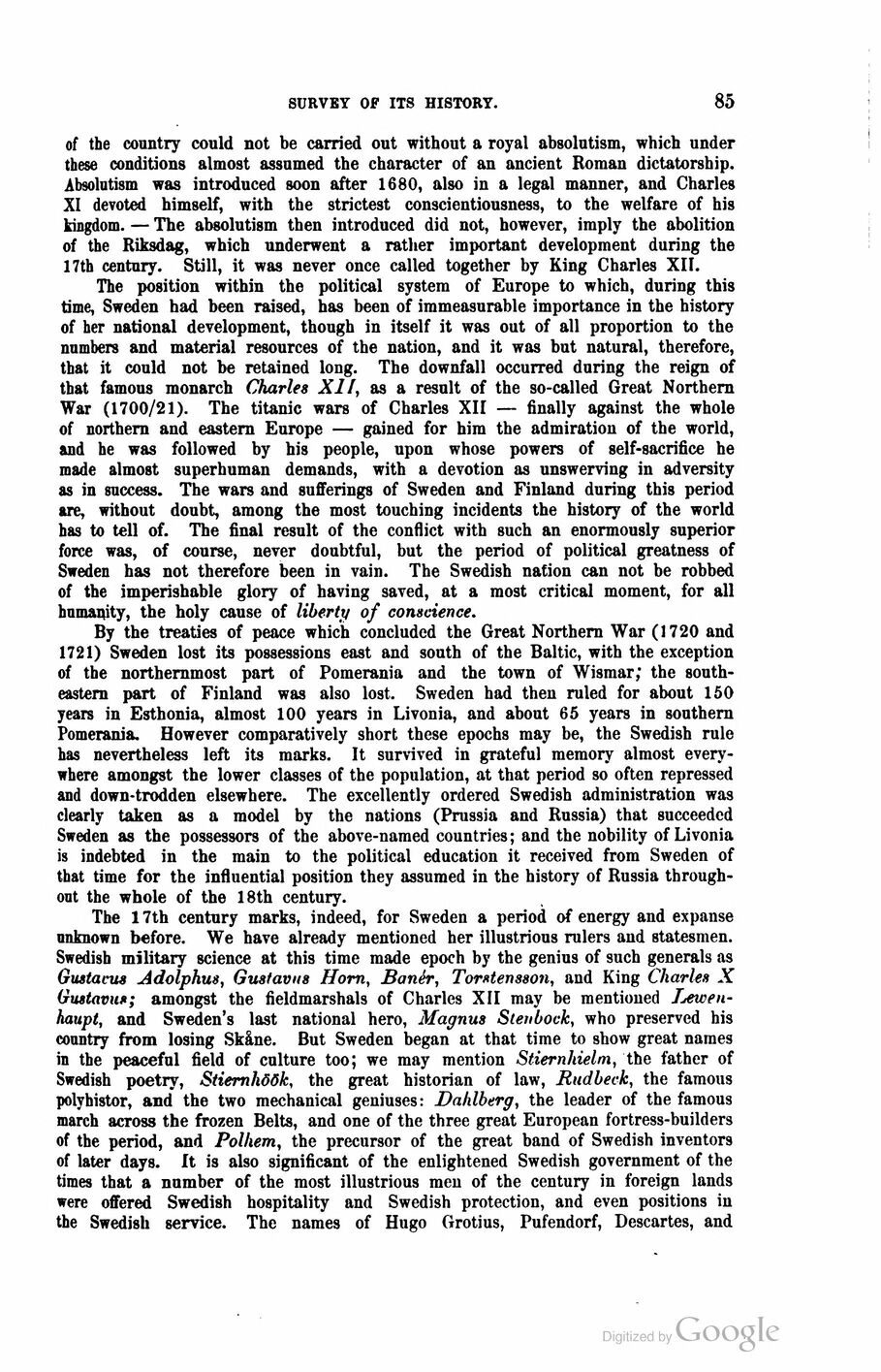
Full resolution (JPEG) - On this page / på denna sida - First part - II. The Swedish People - 1. Survey of its History. By E. Svensén, Author, Stockholm - Modern Times (from 1523 onwards)

<< prev. page << föreg. sida << >> nästa sida >> next page >>
Below is the raw OCR text
from the above scanned image.
Do you see an error? Proofread the page now!
Här nedan syns maskintolkade texten från faksimilbilden ovan.
Ser du något fel? Korrekturläs sidan nu!
This page has never been proofread. / Denna sida har aldrig korrekturlästs.
SURVEY OF ITS HISTORY.
85
of the country could not be carried out without a royal absolutism, which under
these conditions almost assumed the character of an ancient Roman dictatorship.
Absolutism was introduced soon after 1680, also in a legal manner, and Charles
XI devoted himself, with the strictest conscientiousness, to the welfare of his
kingdom. — The absolutism then introduced did not, however, imply the abolition
of the Riksdag, which underwent a rather important development during the
17th century. Still, it was never once called together by King Charles XII.
The position within the political system of Europe to which, during this
time, Sweden had been raised, has been of immeasurable importance in the history
of her national development, though in itself it was out of all proportion to the
numbers and material resources of the nation, and it was but natural, therefore,
that it could not be retained long. The downfall occurred during the reign of
that famous monarch Charles XII, as a result of the so-called Great Northern
War (1700/21). The titanic wars of Charles XII — finally against the whole
of northern and eastern Europe — gained for him the admiration of the world,
and he was followed by his people, upon whose powers of self-sacrifice he
made almost superhuman demands, with a devotion as unswerving in adversity
as in success. The wars and sufferings of Sweden and Finland during this period
are, without doubt, among the most touching incidents the history of the world
has to tell of. The final result of the conflict with such an enormously superior
force was, of course, never doubtful, but the period of political greatness of
Sweden has not therefore been in vain. The Swedish nation can not be robbed
of the imperishable glory of having saved, at a most critical moment, for all
hnmaqity, the holy cause of liberty of conscience.
By the treaties of peace which concluded the Great Northern War (1720 and
1721) Sweden lost its possessions east and south of the Baltic, with the exception
of the northernmost part of Pomerania and the town of Wismar; the
southeastern part of Finland was also lost. Sweden had then ruled for about 150
years in Esthonia, almost 100 years in Livonia, and about 65 years in southern
Pomerania. However comparatively short these epochs may be, the Swedish rule
has nevertheless left its marks. It survived in grateful memory almost
everywhere amongst the lower classes of the population, at that period so often repressed
and down-trodden elsewhere. The excellently ordered Swedish administration was
clearly taken as a model by the nations (Prussia and Russia) that succeeded
Sweden as the possessors of the above-named countries; and the nobility of Livonia
is indebted in the main to the political education it received from Sweden of
that time for the influential position they assumed in the history of Russia
throughout the whole of the 18th century.
The 17th century marks, indeed, for Sweden a period of energy and expanse
unknown before. We have already mentioned her illustrious rulers and statesmen.
Swedish military science at this time made epoch by the genius of such generals as
Gustacus Adolphus, Gustavas Horn, Banér, Torstensson, and King Charles X
Gustavus; amongst the fieldmarshals of Charles XII may be mentioned
lewenhaupt, and Sweden’s last national hero, Magnus Stenbock, who preserved his
country from losing Skåne. But Sweden began at that time to show great names
in the peaceful field of culture too; we may mention Stiernhielm, the father of
Swedish poetry, Stiernhöök, the great historian of law, Rudbeck, the famous
polyhistor, and the two mechanical geniuses: Dahlberg, the leader of the famous
march across the frozen Belts, and one of the three great European fortress-builders
of the period, and Polhem, the precursor of the great band of Swedish inventors
of later days. It is also significant of the enlightened Swedish government of the
times that a number of the most illustrious men of the century in foreign lands
were offered Swedish hospitality and Swedish protection, and even positions in
the Swedish service. The names of Hugo Grotius, Pufendorf, Descartes, and
<< prev. page << föreg. sida << >> nästa sida >> next page >>